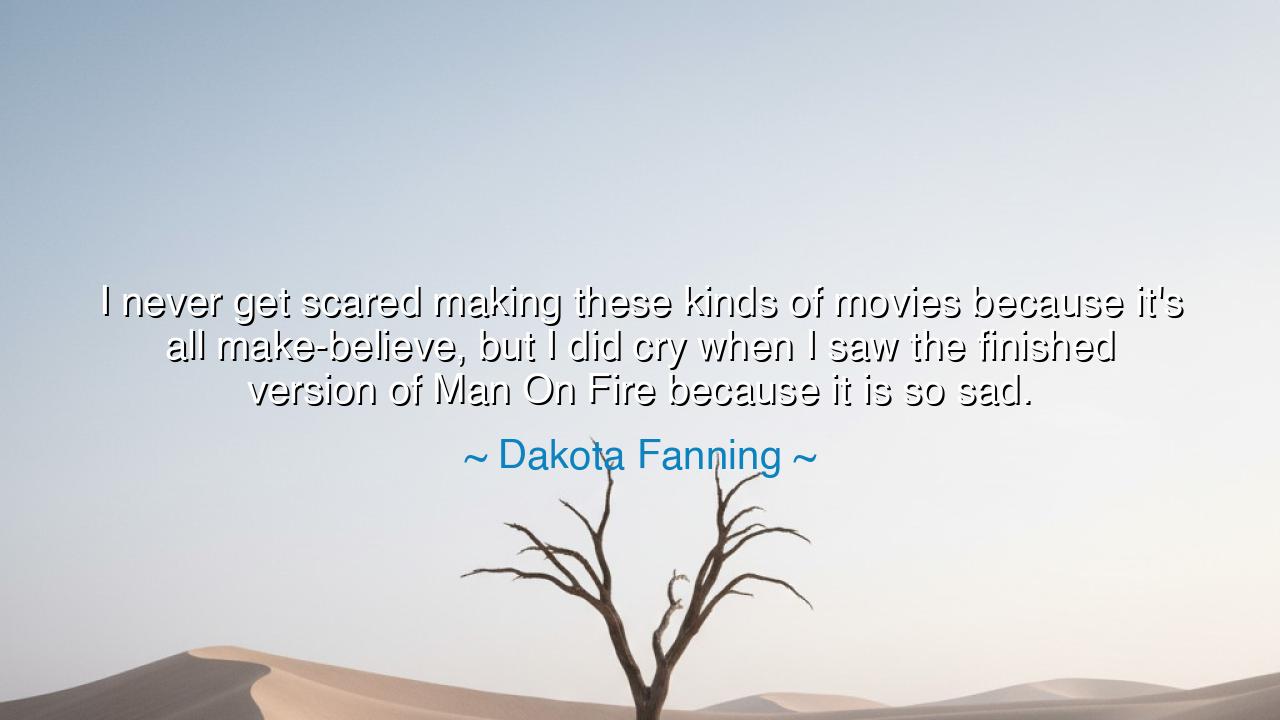
I never get scared making these kinds of movies because it's all
I never get scared making these kinds of movies because it's all make-believe, but I did cry when I saw the finished version of Man On Fire because it is so sad.






There are experiences in art that transcend the boundaries of illusion, touching the soul in ways that even the creator cannot fully anticipate. Dakota Fanning, reflecting on her role in Man On Fire, said, “I never get scared making these kinds of movies because it's all make-believe, but I did cry when I saw the finished version of Man On Fire because it is so sad.” In these words lies the profound realization that while the craft of performance may be deliberate and controlled, the emotional resonance of a story can pierce the heart, reminding us of the power of human empathy and the depth of artistic truth.
Fanning’s reflection distinguishes between the mechanics of creation and the experience of art. On set, actors engage with scripts, cameras, and direction, inhabiting a world that is understood as fabricated. Yet once the film is completed, it becomes something more: a vessel carrying narrative, emotion, and human suffering to the audience. Ancient dramatists recognized this duality. The Greek tragedians, such as Sophocles and Euripides, crafted stories for performance, yet understood that the ultimate power of their work lay in its capacity to move, to evoke sorrow, and to provoke reflection in those who witnessed it.
The sadness that moved Fanning to tears is testimony to the immersive truth of storytelling. Though the narrative is fictional, the emotions it conveys are universally human: grief, loss, and the longing for justice and connection. In the ancient world, Aristotle called this effect catharsis, the purging of emotion through art. By witnessing the trials and suffering of characters, the audience—and the performer themselves—experiences both release and enlightenment. Fanning’s tears reveal the enduring nature of this principle: fiction, when imbued with truth, evokes genuine empathy.
History offers countless examples of creators touched by their own work. Consider Victor Hugo, who was moved to tears by the performance of his own plays, or Anna Deavere Smith, whose portrayals of real-life stories of injustice left her emotionally shaken even as she spoke the lines she had meticulously studied. Fanning’s experience echoes this ancient phenomenon: the act of creation does not shield the creator from emotional truth; it amplifies it. The artist is both witness and participant in the story’s power.
There is also a lesson in the interplay between imagination and reality. Fanning was not scared during production because the danger was illusory, yet the final product reminded her that even imagined events can evoke authentic emotion. This illustrates the wisdom of the ancients, who understood that art is a bridge between human experience and representation. Fiction may be invented, but its ability to reflect suffering, hope, and virtue is real, and it can awaken feelings that are profoundly genuine.
Fanning’s reflection underscores the transformative potential of narrative. Stories are not mere entertainment; they are tools for understanding, empathy, and moral reflection. When we engage with narratives of sadness or loss, we are reminded of the fragility of life, the depth of human emotion, and the importance of compassion. Ancient sages, from Confucius to Seneca, emphasized the educational and moral power of narrative: it shapes the heart and mind as surely as it entertains.
The universal lesson in Fanning’s words is clear: even make-believe can teach us about reality, even sadness can instruct and connect. We are called to allow ourselves to feel, to be moved, and to learn from the stories we create or consume. Art’s greatest gift lies in its ability to awaken empathy, to bridge distance between individual and experience, and to leave a lasting mark on the soul.
Thus, let Dakota Fanning’s reflection guide us: engage with art fully, embrace the emotions it evokes, and recognize that even stories born of imagination can resonate with profound truth. Cry when the tale is sad, rejoice when it uplifts, and allow the experience to deepen your understanding of humanity. In doing so, we honor the transformative power of storytelling, both for the creator and for all who bear witness.






AAdministratorAdministrator
Welcome, honored guests. Please leave a comment, we will respond soon